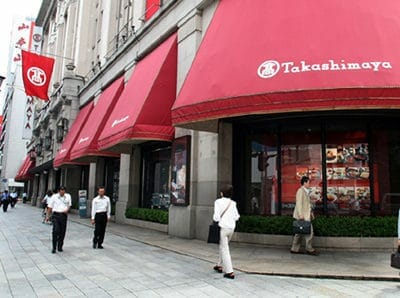
Takashimaya will close its remaining Shanghai store in August
Retail leads the way in Mingtiandi’s roundup of Asia real estate headlines today with the news that a loss-making Japanese retailer is closing its department store in Shanghai and pulling out of China.
In other news around the region, co-working rents are set to rise even as demand slows in the world’s least affordable city, foreign property investment in China hit a record $2.7 billion and Alibaba says it has found the solution to people walking off without paying for things in its unmanned shops.
Japanese Retailer Takashimaya Pulls out of China
Japanese department store chain Takashimaya will close its flagship store in Shanghai in August and halt its operations in China, Nikkei has learned.
The store has been losing money and the Osaka-based company decided it would be difficult to turn the business around as private consumption has slowed in China amid the trade war with the US. Read more>>
Hong Kong Co-Working Rates Set to Rise
Rents for co-working space in Hong Kong, already the most expensive in Asia-Pacific at $741 per month, are set to rise further as the sector undergoes another wave of consolidation even as uptake slows, say industry operators.
According to the latest report from property agency Colliers, Hong Kong, with 141 shared office centres, topped 14 other cities in the region in terms of average desk cost per month, followed by Beijing at $693, and Sydney at $690. Read more>>
Foreign Investment in China Commercial Property Hits Record $2.7B
Foreign investors are starting to buy commercial real estate in China again, shrugging off frothy prices and the trade dispute with the US while focusing on China’s maturing domestic market and longer-term growth prospects.
Institutional investors—ranging from the US and Switzerland to Bahrain and Singapore—were net buyers of $2.7 billion worth of Chinese commercial real estate in the first quarter, according to Real Capital Analytics. Read more>>
Alibaba’s Sesame Credit Makes Shoppers Honest in Unmanned Stores
The capitalist’s dream of a shop with no human labour is too appealing for the likes of Alibaba to be dissuaded by small problems such as the perishability of food and the need for customers to be trustworthy.
Research firm Trivium reports that Alibaba’s “marketing machine released a video” comparing an experiment four years ago in which only 62 percent of shoppers actually paid for their goods at unmanned stores with a study run last week, involving on-demand rental kiosks, in which 95 percent of customers who rented stuff returned it. Alibaba says the difference in the results is because of Sesame Credit, its affiliate social credit system (SCS). Read more>>
Tune in again tomorrow for more news, and be sure to follow @Mingtiandi on Twitter, or bookmark Mingtiandi’s LinkedIn page for headlines as they happen.
Leave a Reply